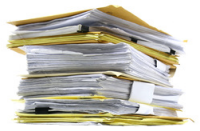At the end of tax season, clients frequently ask us which files do they need to keep and what files can they get rid of for good. And then, there is also the tax return itself.
 Paper or electronic?
Paper or electronic?
If you already have almost all of your tax records and returns in electronic format, then there really isn’t much work to do since there is no reason to delete them to save a minimal amount of disk space. However, it is another story should you have many tax records in hard copy format as the process of migrating decades of files into electronic format could take days if not weeks. We recommend converting hard copy tax returns from at least the last seven years into electronic copy for regulatory purposes and for convenience and disaster recovery reasons.
Technically speaking, the statute of limitations is three years, from the date in which the tax return is filed. Thus, for most circumstances, three years is sufficient. However, there are a few exceptions, in which the statute of limitations is extended, for up to seven years. You also should hang on to copies of your tax returns in case you need to amend a return in a subsequent year. As a side note, the IRS does accept scanned copies of receipts and has so for the past decade.
What about investments?
You will need to keep track of the cost basis of your investments until they are sold. As we highlighted earlier this year, custodians now need to provide the cost basis to the investor and the IRS via form 1099-B. Also, keep record of any stock and dividends you’ve reinvested as this will add to the cost basis of your investment which will be needed to properly calculate your future capital gain or loss.
Don’t forget about your non-deductible IRA contributions that are reported on Form 8606. This form should be kept until you withdraw all the money from your IRA which will prevent you from getting taxed twice.
What about supporting documentation for your home purchases and sales?
Most home improvements can add to your cost basis and thus reduce your capital gains tax should you not qualify for the capital gain tax exclusion ($250,000 for singles; $500,00 for joint filers). Maintain the documents supporting your home purchase price and any improvements made to the house for at least three years after selling it.
What can I get rid of now?
As we wrote earlier, the IRS technically can review your tax return up to seven years but the statute of limitations is three years from the date the return is filed. Therefore, after the three year period passes, you can get rid of most supporting documents except for the year end tax summaries provided by your broker or bank. Specifically, you can shred monthly bank and brokerage statements, ATM receipts, deposit slips, credit card bills, utility bills, phone bills, and cable bills. If these expenses aren’t being claimed on your return, then you can shred them much earlier than three years.
More Tax Questions?
Related Articles
->Lesser Known 2011 Tax Deductions to Claim on Your Personal Return
->What Exactly Happens When The IRS Audits My Tax Return?
->What Happens If I Don’t File a Tax Return?
->What are my chances of being audited by the IRS?
->Prepare for New Cost Basis Reporting on the 1099 B Form
->Does the IRS Accept Scanned Receipts?


